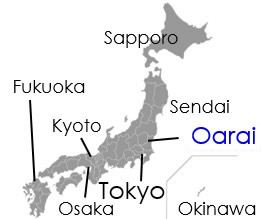International Research Center for Nuclear Materials Science,
Tohoku University Institute for Materials Research
Center Director Dai Aoki
The International Research Center for Nuclear Materials Science, Institute for Materials Research, Tohoku University (IRCNMS, commonly known as Oarai Center), was established in 1969 as a facility adjacent to the Japan Materials Testing Reactor (JMTR). Since then, the center has been advancing research in material development for the nuclear field and in the physics and chemistry of actinide elements.
Currently, the Oarai Center serves as a user facility where a wide range of research is conducted. This includes studies on material research for nuclear power plants, the development of new materials for future energy sources such as fast reactors and fusion reactors, the exploration of new materials and novel properties in actinide compounds and related quantum materials, the development of new nuclear fuels, radiochemistry and research related to nuclear wastes. Every year, the center receives about 100 applications for joint use, with a quarter of these being international collaborative projects involving researchers from abroad. The Oarai Center is equipped with world-class facilities, including instruments that enable consistent analysis at the nanoscale, such as transmission electron microscopes and three-dimensional atom probes, as well as dilution refrigerators suitable for measuring quantum oscillation effects under extreme conditions of low temperature and high magnetic fields. These capabilities allow for nano-analysis, material exploration, and physical property measurements under extreme conditions in controlled areas for radioactive materials.
Since the Fukushima Daiichi Nuclear Power Plant accident following the Great East Japan Earthquake in March 2011, the environment surrounding nuclear materials research has changed significantly. While societal needs for research that contributes to safety, security, and decommissioning have increased, the importance of developing human resources necessary for the future of nuclear power has become more widely recognized. However, neutron irradiation experiments, which are fundamental to nuclear materials research, are now predominantly conducted using overseas facilities. Additionally, universities face the challenge of managing and operating joint-use research facilities that handle radioactive isotopes and nuclear fuel materials, as the generation of researchers who supported the early days of nuclear power is reaching retirement, requiring considerable resources.
In light of these circumstances, the Oarai Center is expanding its scope beyond nuclear materials research, leveraging its hot lab, advanced analytical, and physical measurement capabilities to contribute to the broader research community. The center also considers the education and training of graduate students and young researchers through the aforementioned research and initiatives such as the “Summer School” to be one of its unique and crucial missions. We kindly ask for your continued support and guidance in the years to come.


